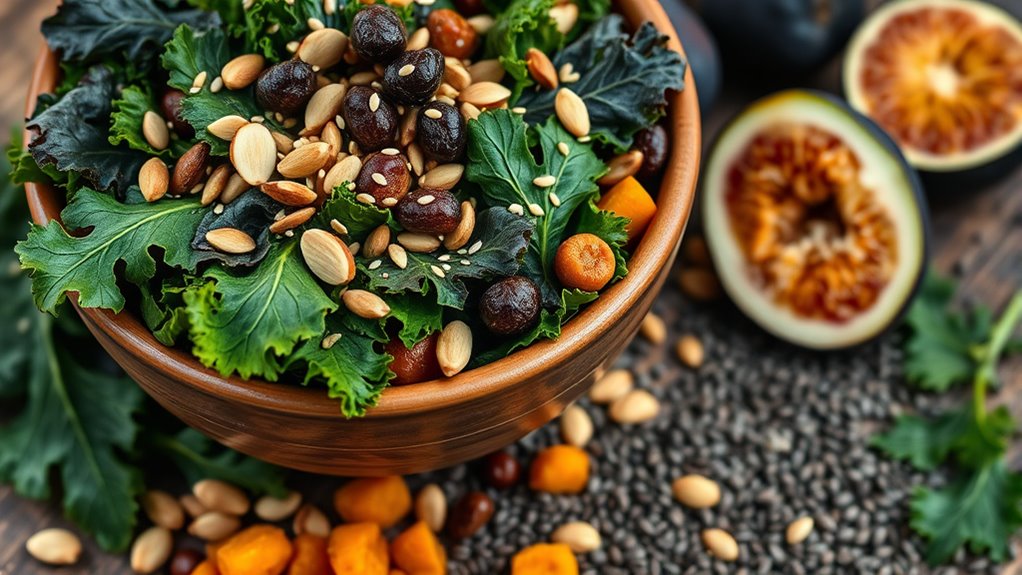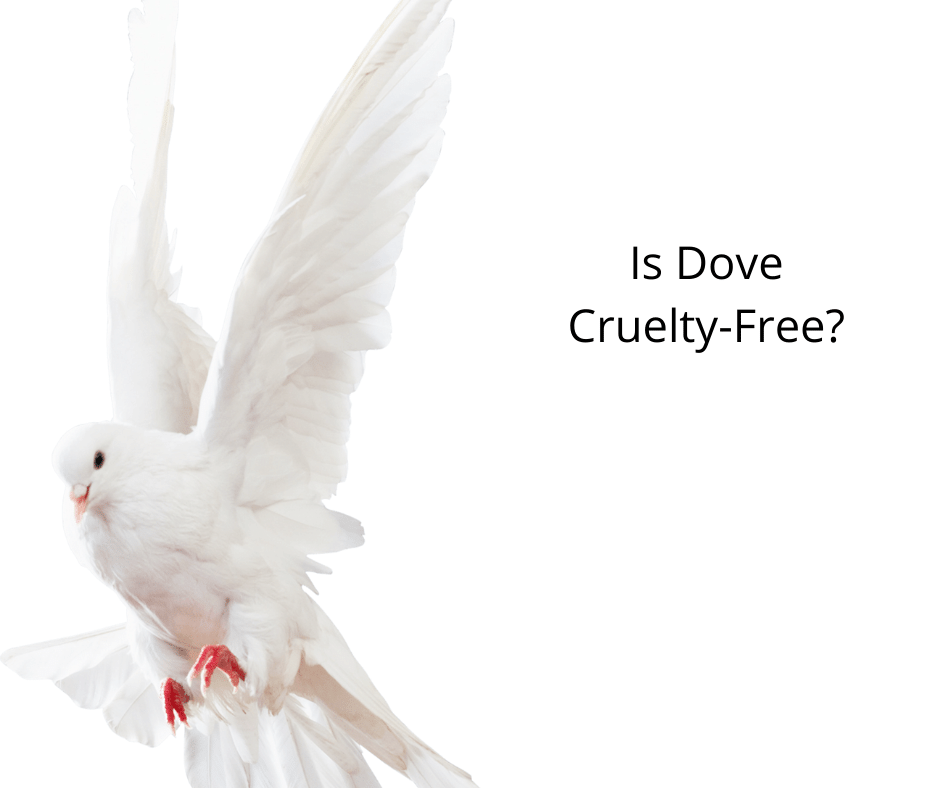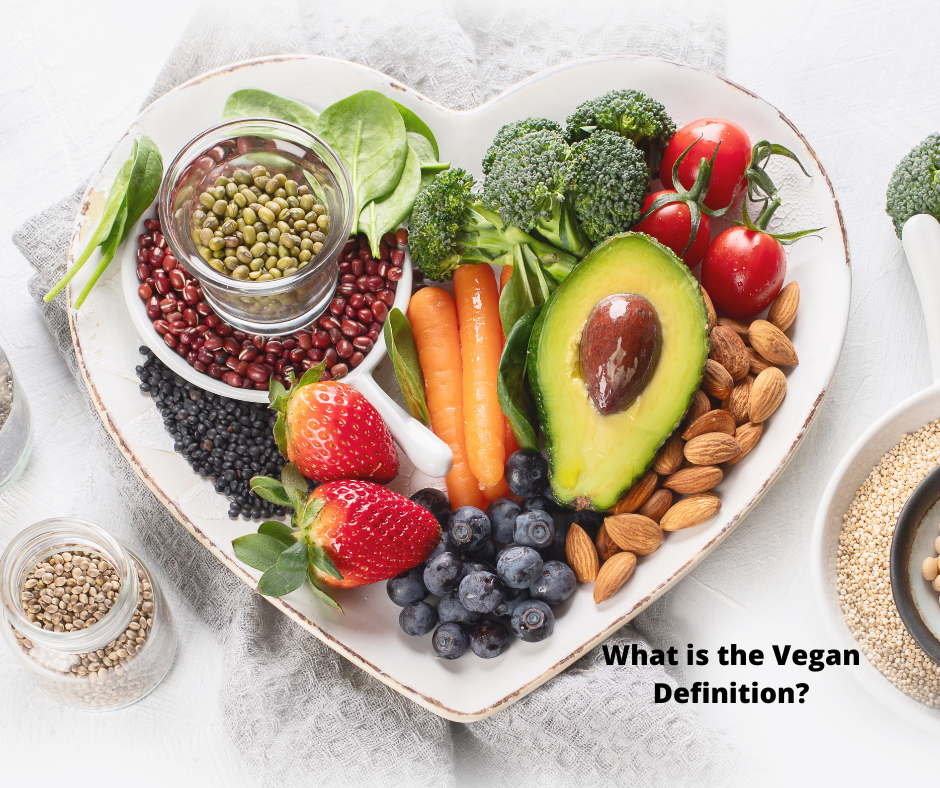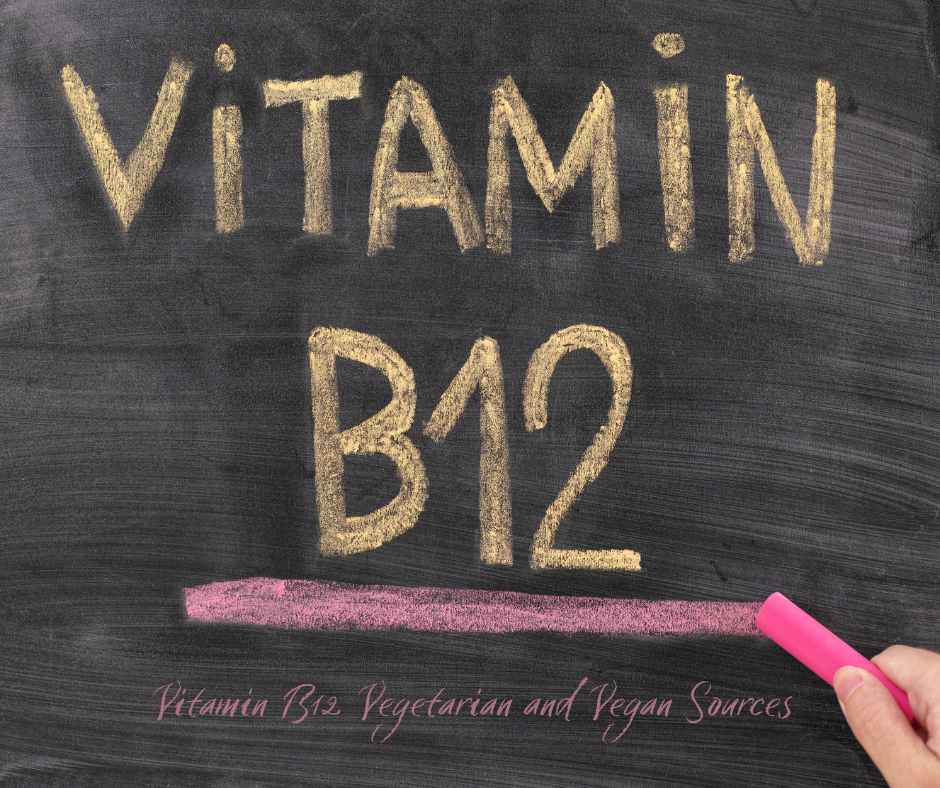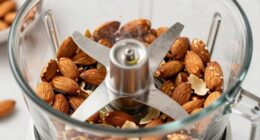You can boost calcium intake from plant sources like leafy greens such as kale, collard greens, and bok choy, which have good absorption rates. Fortified plant milks, juices, and cereals are also great options, often enriched with calcium and vitamin D. Incorporate nuts, seeds, legumes, dried fruits like figs and apricots, and even tofu or tempeh into your meals for added calcium. Keep exploring these options to discover how to meet your needs naturally.
Key Takeaways
- Leafy greens like kale, collard greens, and bok choy offer natural, plant-based calcium with high bioavailability.
- Fortified plant milks, juices, and cereals provide calcium-rich options without dairy, often enhanced with vitamin D.
- Legumes, nuts, seeds, and dried fruits such as figs and apricots are portable, calcium-dense snacks supporting bone health.
- Tofu and tempeh are versatile, calcium-rich plant proteins that contribute significantly to daily calcium intake.
- Proper preparation techniques like soaking and cooking improve calcium bioavailability from phytate-rich plant foods.
Leafy Green Vegetables

Are leafy green vegetables a good source of calcium for vegans? They can be, but understanding calcium absorption is key. While greens like kale, collard greens, and bok choy contain calcium, the bioavailability of nutrients varies. Oxalates in some greens, such as spinach, hinder calcium absorption by binding to calcium and forming insoluble compounds. On the other hand, greens with lower oxalate levels, like kale, offer better bioavailability of nutrients, making your body more efficient at absorbing calcium. Including a variety of leafy greens can help maximize calcium intake. Remember, even if a vegetable contains calcium, its effectiveness as a source depends on how well your body can absorb and utilize it. So, choose greens wisely to boost your calcium levels effectively.
Fortified Plant Milks and Juices

Fortified plant milks and juices can be be excellent sources of calcium, but their fortification levels vary. It’s important to verify how much calcium is added to guarantee you’re meeting your daily needs. While some naturally contain calcium, most rely on fortification to provide sufficient amounts. Additionally, artistic representations of calcium content can influence consumer choices and perceptions. Incorporating these beverages into your diet can support overall health maintenance and prevention efforts.
Subheading 1: Calcium Fortification Levels
Many plant-based milks and fruit juices are enriched with calcium to help vegans meet their daily nutritional needs. The fortification levels vary, ensuring you get enough calcium to support bone health and prevent deficiencies. However, remember that calcium absorption depends on bioavailability factors like the type of calcium used and presence of inhibitors. Fortified drinks often contain calcium carbonate or citrate, which have different absorption rates. It’s essential to check labels for calcium content and consider how well your body can absorb it. Consuming these beverages regularly can boost your calcium intake, but balancing fortification with natural sources is ideal. Additionally, understanding calcium bioavailability can help you make better choices about which fortified drinks to include in your diet. Recognizing the bioavailability differences among calcium sources can further optimize your calcium absorption. Being aware of factors like absorption rates can help you maximize the benefits of your calcium intake. Moreover, recent advancements in AI technology are being used to develop personalized nutrition plans that optimize mineral absorption based on individual genetics and health data.
Subheading 2: Naturally Occurring Calcium Content
While fortified drinks are a convenient way to boost calcium intake, natural sources also play an essential role in meeting your nutritional needs. Foods like leafy greens, almonds, sesame seeds, and certain vegetables contain calcium naturally, offering a valuable alternative. Keep in mind that bioavailability factors influence how well your body can absorb calcium from these sources, making it important to choose foods with higher absorption rates. For example, calcium from plant-based sources like bok choy or broccoli tends to be more readily absorbed compared to some greens high in oxalates. Including a variety of these foods can enhance calcium absorption, ensuring your body gets the support it needs for strong bones and overall health. Additionally, ongoing advancements in natural nutrient bioavailability research help us better understand how to optimize calcium intake from plant foods. Incorporating plant-based calcium sources that are rich in bioavailable calcium can further improve your nutritional intake. Recognizing the calcium absorption differences among various plant foods can help you tailor your diet more effectively. Paying attention to factors like vitamin D levels can also support calcium absorption from these natural sources. Natural calcium sources are an integral part of a balanced vegan diet.
Tofu and Tempeh
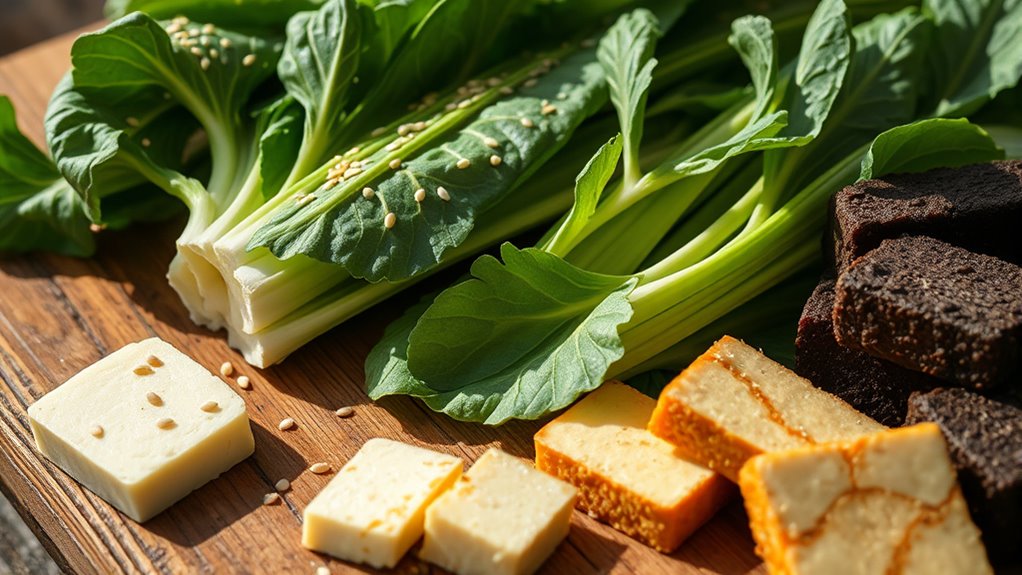
You’ll find that tofu and tempeh are excellent sources of plant-based calcium and protein. Incorporating them into your meals helps boost your nutrient intake naturally. These versatile foods make it easy to meet your daily calcium needs without relying on dairy. Additionally, their high calcium content supports bone health and overall wellness. Recognizing refrigerant management can also guide you toward positive relationship opportunities and personal growth.
Rich Plant-Based Calcium
If you’re looking to boost your calcium intake from plant-based sources, tofu and tempeh are among the best options available. These foods offer impressive calcium bioavailability, meaning your body can efficiently absorb and use the mineral. Incorporating them into your diet helps support strong bones and overall health. Plus, their versatility makes it easy to enjoy a variety of delicious meals. Using accurate measurement units when preparing these foods ensures you’re getting the right amount of calcium in your diet.
High-Protein Content
Tofu and tempeh stand out as excellent plant-based sources of protein, making them essential staples in a vegan diet. They also offer moderate calcium, which can assist calcium absorption when combined with other sources. Their bioavailability factors are high, meaning your body efficiently utilizes the protein and calcium they provide. Here’s a quick comparison:
| Food | Protein Content (per 100g) | Calcium Content (per 100g) |
|---|---|---|
| Tofu | 8g | 253mg |
| Tempeh | 19g | 111mg |
| Both aid calcium absorption, but bioavailability varies based on processing. Choosing unfermented options like tofu can maximize calcium bioavailability. Incorporating these foods ensures you get essential protein while supporting your calcium intake efficiently. Processing methods can influence nutrient absorption and bioavailability.
Nuts and Seeds
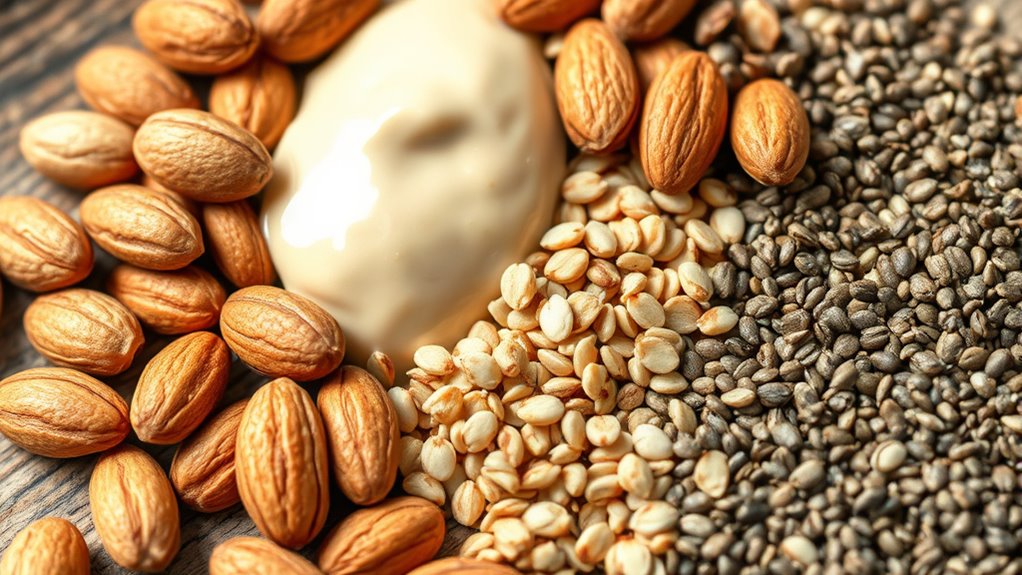
Nuts and seeds are excellent plant-based sources of calcium, making them valuable additions to a vegan diet. They not only provide calcium but also support ideal calcium absorption through nutrient synergy with other minerals. Including a variety of nuts and seeds can boost your intake and enhance overall bone health.
Imagine the crunch of almonds or the richness of sesame seeds fueling your day. These foods evoke feelings of nourishment and strength, helping you stay energized and confident.
- Feel empowered by snacking on crunchy almonds, packed with calcium and healthy fats
- Savor the nutty flavor of chia seeds, boosting calcium and omega-3 intake
- Enjoy the versatility of sunflower seeds, rich in nutrients that support calcium absorption
- Incorporate tahini into your meals for a delicious, calcium-rich boost
Legumes and Beans
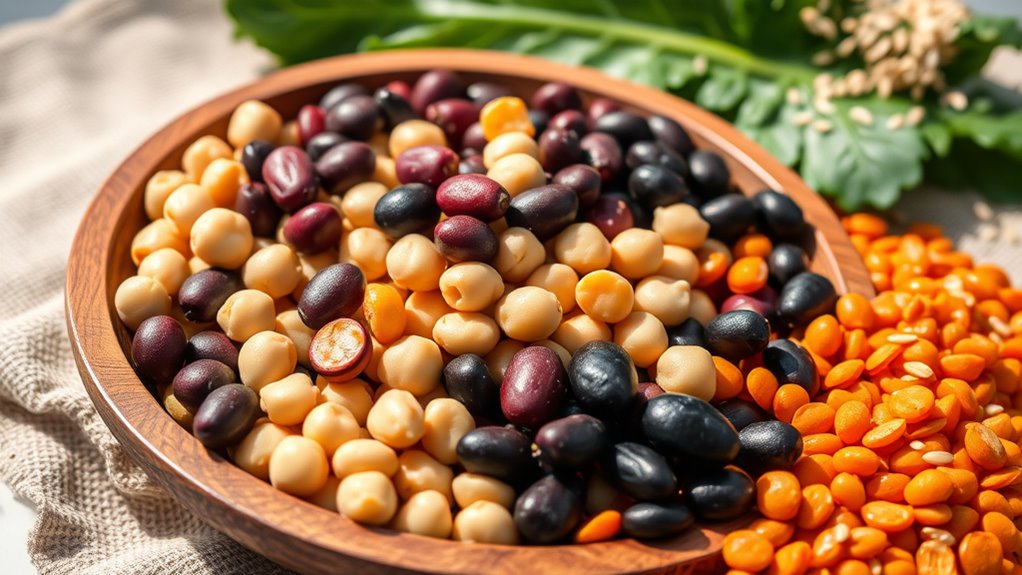
Did you know that legumes and beans are some of the best plant-based sources of calcium? Their calcium absorption mechanisms make them valuable for vegans seeking strong bones. While they contain calcium, their plant-based calcium bioavailability can vary due to compounds like phytates and oxalates, which may inhibit absorption. However, soaking, sprouting, or cooking beans can reduce these inhibitors, improving calcium uptake. Legumes such as chickpeas, lentils, and black beans offer a decent calcium amount per serving. Incorporating them into your diet not only boosts calcium intake but also provides protein and fiber. To maximize benefits, combine legumes with vitamin C-rich foods, which can enhance calcium absorption. Additionally, understanding Kia Tuning options reveals that subtle modifications can optimize nutrient absorption and overall health. Recognizing the importance of nutrient bioavailability is crucial when selecting plant-based calcium sources, ensuring that your body can effectively utilize the calcium you consume. Overall, legumes and beans are versatile, nutritious options to support your bone health without relying on dairy.
Dried Fruits and Snacks

Dried fruits and snacks can be surprisingly good sources of calcium for vegans, especially when incorporated into a balanced diet. They make perfect snack pairings that boost your calcium intake on the go. Whether you’re at work, hiking, or relaxing at home, these portable options keep you nourished and energized. Think about snacking on dried figs or apricots, which are naturally rich in calcium. Pair them with nuts or seeds for added crunch and nutrients. Dried fruits like dates and prunes are also convenient for quick calcium boosts. These options are easy to carry and enjoy anytime, turning simple snacks into powerful calcium sources that support your vegan lifestyle. Keep these in mind for delicious, calcium-rich snack pairings. Proper planning can help ensure you meet your nutritional needs while enjoying these tasty options.
Other Fortified Foods and Supplements
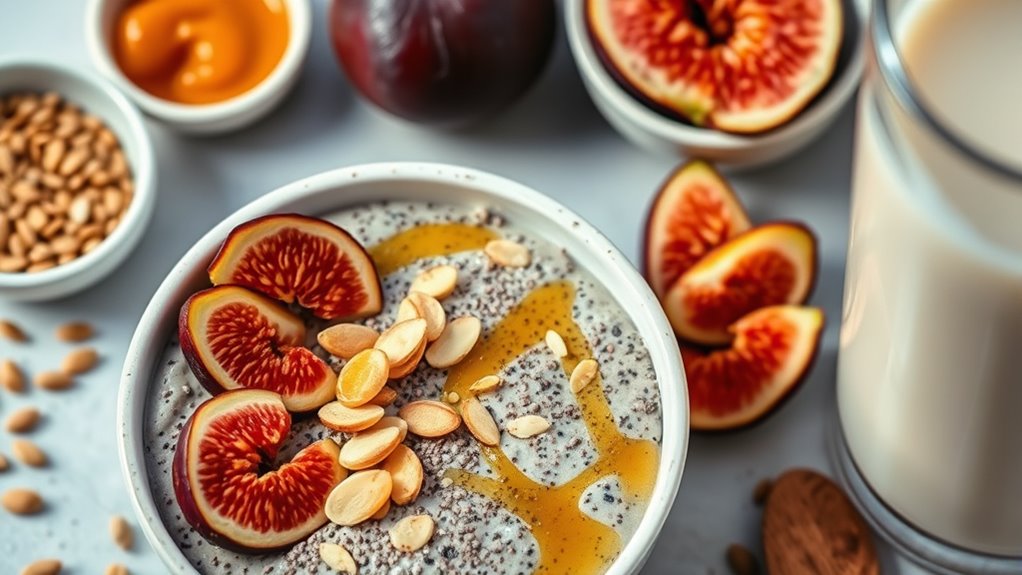
Have you considered fortified foods and supplements as effective ways to boost your calcium intake? They can be convenient, especially when natural sources fall short. Keep in mind, calcium absorption and bioavailability factors influence how well your body utilizes these sources. Some fortified foods, like plant-based milks, contain added calcium that’s highly bioavailable, but others may vary. Supplements, such as calcium citrate or carbonate, provide a predictable dose, but absorption can depend on factors like stomach acidity. Here’s a quick comparison:
| Food Type | Calcium Content | Bioavailability Factors |
|---|---|---|
| Fortified plant milk | 300 mg per cup | Enhanced with vitamin D boosts absorption |
| Calcium supplements | 200-600 mg per dose | Form affects absorption rate |
| Fortified cereal | Varies | Often combined with other nutrients |
| Calcium-fortified juice | 200 mg per serving | Acidic environment aids absorption |
| Supplements with vitamin D | Improves bioavailability | Combines two essential nutrients |
Frequently Asked Questions
Are There Any Natural Calcium-Rich Foods Suitable for Vegans?
You’re wondering if there are natural calcium-rich foods suitable for vegans. Yes, plenty of plant-based options like leafy greens, tofu, and fortified plant-based dairy can boost your calcium intake. Keep in mind that calcium bioavailability varies; some plant sources may be less absorbable. Incorporating a variety of these foods guarantees you get enough calcium, even without dairy, supporting your bone health naturally.
How Much Calcium Do I Need Daily on a Vegan Diet?
You need about 1,000 mg of calcium daily, but your vegan calcium needs can vary based on age and health. To guarantee proper calcium absorption, include a variety of plant-based sources like leafy greens, fortified foods, and seeds. Avoid relying solely on one source, and consider factors like vitamin D and magnesium, which also influence calcium absorption. Monitoring your intake helps meet your daily requirements and supports strong bones.
Can I Get Enough Calcium From Vegan Sources Alone?
Think of your diet as a treasure map, where calcium is the hidden gem. You can absolutely find enough calcium from vegan sources, but you need to be mindful of calcium bioavailability, which varies among foods. Avoid vegan calcium myths that suggest dairy is the only answer. With strategic choices like fortified plant milks, leafy greens, and legumes, you can confidently meet your daily calcium needs without relying on dairy alternatives.
Are Calcium Supplements Necessary for Vegans?
You might wonder if calcium supplements are necessary as a vegan. Many calcium supplement myths suggest you can’t get enough calcium from plant-based sources, but that’s not true. If you eat a balanced vegan diet with leafy greens, fortified foods, and plant-based milks, you may not need supplements. However, vegan supplement options exist if you’re concerned about your intake. Always consult a healthcare professional before adding supplements to your routine.
Does Calcium From Plant Sources Absorb as Well as From Dairy?
Think of your body as a sponge soaking up calcium. Plant-based bioavailability varies, so calcium absorption efficiency from plants isn’t always the same as from dairy. Some plant sources contain compounds like oxalates that can block absorption, but others, like bok choy or broccoli, have higher bioavailability. You can still meet your calcium needs through diverse plant foods, but understanding absorption helps you optimize your intake and keep your bones strong.
Conclusion
Did you know that many plant-based foods can provide as much calcium as dairy? By including leafy greens, fortified drinks, tofu, nuts, and legumes in your diet, you can easily meet your calcium needs without dairy. Notably, vegans often consume about 45% more calcium from plant sources than non-vegans. So, explore these options and enjoy a variety of delicious, calcium-rich foods to keep your bones strong and healthy!
Hi, I’m Alexander. I’m a vegan of over 20 years, and I initially made the switch for health reasons. However, as time went on, I became more and more passionate about the ethical and environmental implications of leading a vegan lifestyle.
I am the author of The Graceful Kitchen, a vegan blog where I share recipes for delicious and nutritious vegan meals. As someone who is deeply committed to living a cruelty-free life, I am also a strong advocate for using whole foods as the foundation of a healthy diet – and believe that going vegan is one of the best ways to achieve this.
